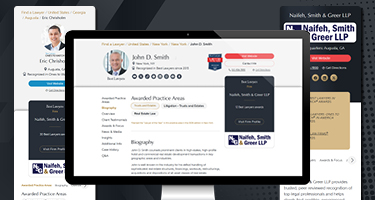As digital marketing expands, content marketing has become essential for law firms seeking to strengthen client relationships and maintain a credible online presence.
The content marketing industry is expected to reach $600 billion this year alone, illustrating a major shift toward strategies that prioritize client engagement and trust-building over direct advertising.
For law firms, content marketing is more than a tool for visibility; it’s a way to establish authority, highlight expertise and develop lasting client connections through informative and accessible content.
In this article, we will:
- explore why content marketing is crucial for law firms
- examine different types of valuable content for law firms
- discuss effective distribution strategies
- review ways to measure success
Why is Content Marketing Important for Law Firms?
Understanding why content marketing is crucial for law firms begins with seeing its benefits for credibility, client engagement and online presence. Here’s how content marketing can make a difference:
1. Building Trust, Engagement and Client Acquisition
For law firms, establishing trust and credibility is essential. Nearly 47% of B2B clients consume multiple pieces of content before engaging a service provider, showing the impact of legal content marketing on client confidence.
By providing high-quality materials that address client questions, law firms demonstrate the role of content for lawyers in building trust and making their expertise approachable, helping clients feel confident about engaging their services.
Creating resources like articles, blogs and videos that explain legal processes, client rights, or common misconceptions opens doors for ongoing communication.
74% of companies report increased lead generation from content marketing, demonstrating its role in guiding readers toward conversion.
Through strategic, insightful content, law firms can create meaningful touchpoints that lead potential clients from inquiry to consultation.
2. Better SEO and Online Visibility
One of the most powerful benefits of content marketing is its impact on search engine optimization (SEO). Over 51% of all content engagement originates from organic search, highlighting the reasons your law firm needs an effective content strategy for visibility.
By integrating SEO best practices—such as keywords, high-quality content and backlinking—your law firm can improve its chances of appearing in search results when clients look for legal assistance or advice.
Must-Have Content Types for Engaging Legal Clients
Creating diverse content types allows you to reach a broader audience, catering to different learning styles and preferences. Here are the most effective types of content for law firms:
1. Educational Articles and Legal Guides
Educational content remains a cornerstone of content marketing for law firms. Legal guides, FAQs and informational blogs address common questions and challenges, providing value to clients even before they’ve engaged the firm’s services.
2. Case Studies and Client Success Stories (When Allowed)
Sharing case studies or client success stories can illustrate your firm’s expertise and past successes. However, it’s essential to first obtain client approval and confirm that sharing these testimonials complies with your state’s bar association regulations.
When permitted, anonymized stories can highlight a firm’s strategic approaches and positive outcomes while respecting client confidentiality.
Potential clients often find value in understanding a firm’s real-world impact and case studies provide a relatable, reassuring narrative.
3. Video Content and Webinars
Video content has become a highly effective marketing tool, with 91% of businesses using it to engage audiences. Your law firm’s videos can cover complex legal topics, explaining processes and legal terms in accessible ways.
Webinars on pressing legal issues, like recent changes in tax law or evolving employment regulations, allow firms to engage directly with potential clients, answering questions and establishing expertise.
4. E-books or White Papers
For clients seeking in-depth information, e-books and white papers offer comprehensive coverage on specific legal topics.
This type of content is particularly effective for businesses or clients facing complex legal matters, as it allows them to explore the firm’s depth of knowledge.
How to Distribute Law Firm Content for Maximum Reach
Creating high-quality content is only the first step—distribution plays a crucial role in ensuring content reaches the right audience. Here are key channels law firms should use:
1. Law Firm Blog and Website
Your law firm’s blog or website is the foundation of your digital presence. A well-optimized site with relevant keywords, fast load speeds and mobile-friendly design makes it easier for potential clients to find your content.
As already mentioned, SEO plays a key role in ensuring your blog and website rank well in search results, connecting your expertise with those actively seeking legal guidance.
2. Social Media and Community Building
Social media platforms are essential for law firms to establish community connections and expand their reach. Through informative posts and engagement with followers, law firms can showcase expertise while building an online presence.
Research shows that 73% of businesses distribute content via social media, making it a key channel for client engagement and relationship building.
3. Email Marketing
Email marketing remains one of the most effective ways to distribute content to both current clients and new leads. Your law firm can use newsletters to share recent blog posts, legal insights and firm updates. This ongoing communication keeps the firm top-of-mind and demonstrates its commitment to keeping clients informed.
4. Legal Directories and Online Profiles
Having a presence in online directories like Best Lawyers helps improve a law firm’s visibility. A legal directory enhances SEO by providing backlinks and serving as a reputable source for prospective clients to find legal professionals. Listings often appear in search results, offering law firms additional exposure.
How to Measure Content Marketing ROI for Law Firms
To gauge the effectiveness of content marketing, law firms should implement clear tracking methods. Here are some of the metrics to consider:
1. Tracking Leads and Client Inquiries
Measuring lead generation and client inquiries is essential for understanding content’s impact. Tools like Google Analytics can track where website traffic originates, whether through organic search, social media, or email. By observing traffic sources, your law firm can identify the most effective content types and distribution channels.
2. Engagement Metrics
Engagement metrics—such as time spent on pages, social shares and click-through rates—provide insight into how readers are interacting with content. High engagement indicates that the content is resonating with the audience, which is critical for building trust and encouraging conversions.
3. Conversion Rate
Conversion rate tracks the percentage of visitors who turn into clients after engaging with your content. For example, monitoring how many readers of a blog post proceed to book a consultation provides insight into content effectiveness.
Conversion tracking plays a crucial role in evaluating ROI by showing how well content guides potential clients through the decision-making process.
4. Client Feedback and Reputation
Client testimonials, reviews and feedback provide qualitative data on content’s effectiveness. Positive reviews about a firm’s resources or informational content can attract new clients and reinforce the firm’s reputation as an authority.
Empower Your Law Firm’s Growth
Want to attract clients, build trust, and establish your firm as a leader in competitive markets? Discover actionable steps, proven SEO strategies and exclusive tools in our step-by-step guide designed specifically for small and mid-sized law firms.
Access our free guide now to elevate your online presence and drive growth.
































